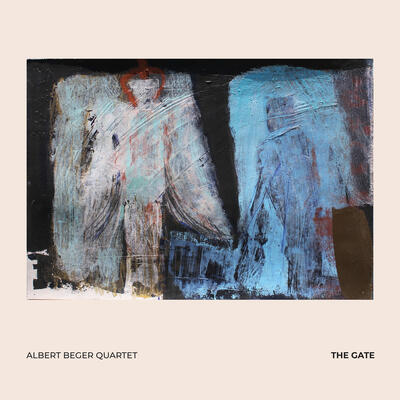Featuring: Albert Beger
Musicians on the recording
Albert Beger - saxophones and shakuhachi
Milton Michaeli - piano
Shay Hazan - bass
Ofer Bymel - drums
Recording track list
Side A
THE GATE
ZEN
SHAKUHACHI IMPRO
Side B
BIRDS AND TREES
THIS IS IT!
SILENCE
NoBusiness Records NBLP 126
Release year - 2019
Edition of 300 copies
Credits and release info
- All compositions by Albert Beger
- Recorded on May 31st and June 1st, 2017 at Alt Studio, Afula, Israel
- Recorded and mixed by Yoram Lev and Itay Alter
- Mastered by Arūnas Zujus at MAMAstudios
- Cover art by Anat Beger
- Back cover photo by Itay Alter
- Design by Oskaras Anosovas
Reviews and articles
Eyal Hareuveni - Free Jazz Blog
The Beger Quartet is Beger's most stable outfit with recording career of about 25 years, featuring a generation younger musicians - pianist Milton Michaeli, double bass player Shay Hazan and drummer Ofer Bymel (who replaced Adam Cohen and recently was replaced by Hagai Freshtman, who collaborated before with Beger). The Gate was recorded in the summer of 2017 in Afula, Israel.
Beger, asu usual, wrote all the compositions for The Gate, but now opted for more introspective-spiritual vein that represents his deep connection with the Afro-American free jazz forefathers. Beger himself is a long-time yoga practitioner and vegan and the six compositions reflect his own perspective of jazz music as a gate to better realization of the self and its virtues of compassion. Beger’s tone - on the tenor sax and Japanese Shakuhachi bamboo flute flute, identified with Zen Buddhism, is still charismatic and muscular but emphasizes more than ever his contemplative side, avoiding immediate ecstatic outbursts, and seeking a cohesive and strong quartet sound. And indeed, Michaeli, Hazan and Bymel are following his lead closely and adding rich yet modest focused, nuanced layers to Beger’s ideas.
The main pieces, “Zen” and “This Is It”, stress this patient, persistent and almost meditational-ritualistic way one seeks a deeper understanding of his art and true self in the art of the moment. This way is achieved by a generous sharing of your resources, by building together the necessary power for such an intense journey and with emphatic support until reaching the inevitable, liberating emotional climax. The silent and meditative “Shakuhachi impro”, for solo Shakuhachi, injects subtle Western playfulness to the whispering tones of the flute. The last piece, “Silence”, brings the Shakuhachi into a sparse free jazz atmosphere in a manner that offers a new ceremonial experience, suggestive and emotional.
